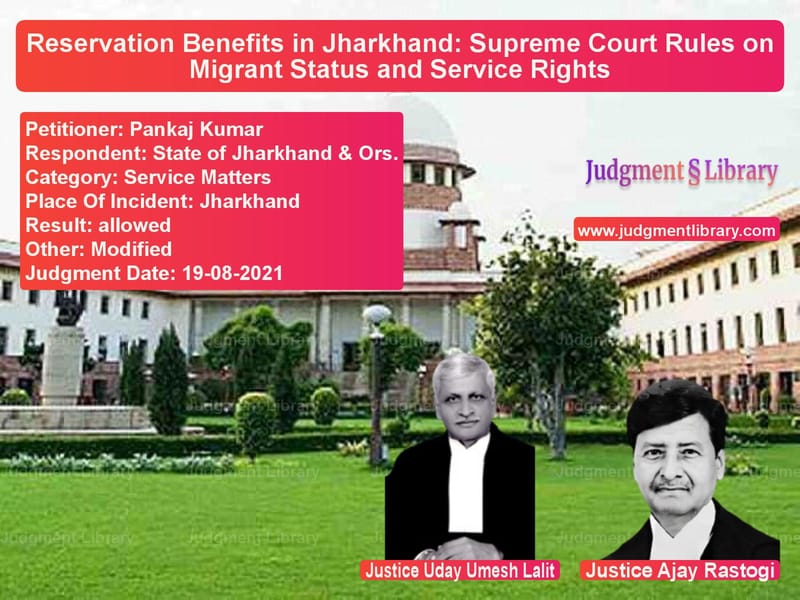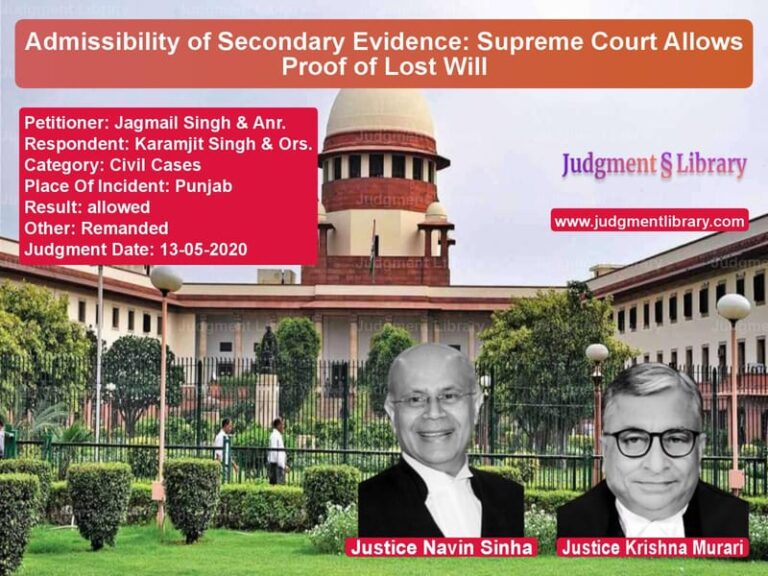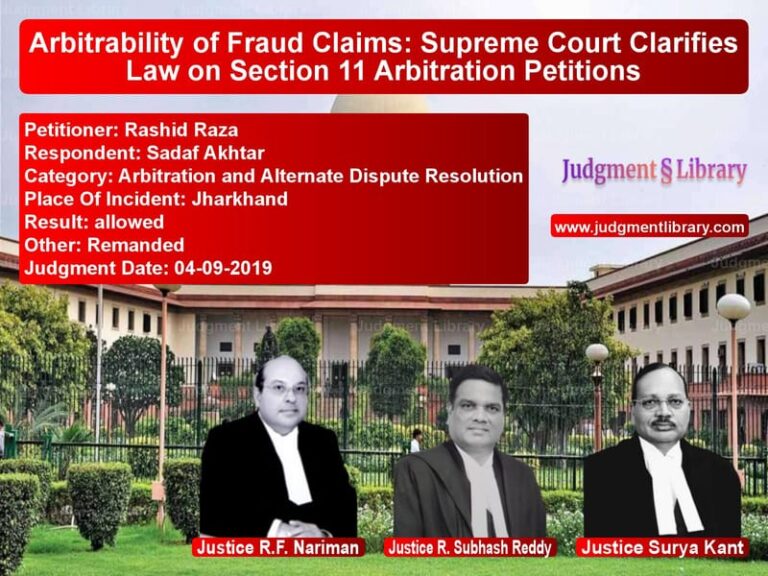Reservation Benefits in Jharkhand: Supreme Court Rules on Migrant Status and Service Rights
The case of Pankaj Kumar vs. State of Jharkhand & Ors. involved a critical legal question: whether individuals originally from Bihar, but residing in Jharkhand after the bifurcation of the state in 2000, could claim reservation benefits in Jharkhand. The Supreme Court addressed issues of migration, caste certification, and the rights of individuals whose service was affected by state bifurcation.
Case Background
Pankaj Kumar, the petitioner, was born in 1974 in Hazaribagh, a district that became part of Jharkhand after the Bihar Reorganisation Act, 2000. He belonged to the Scheduled Caste category and obtained a caste certificate in Jharkhand. He was appointed as an Assistant Teacher in Jharkhand in 1999 and later applied for the 2008 Combined Civil Services Examination under the SC category. Despite being selected and securing a place on the merit list, he was denied appointment on the ground that he was a ‘migrant’ from Bihar and could not claim SC benefits in Jharkhand.
Similarly, a batch of petitioners who had been appointed as constables in Jharkhand under SC/ST/OBC reservation faced termination on the ground that their caste certificates were issued in Bihar, making them ineligible for Jharkhand’s reserved category benefits.
Arguments by the Petitioners
- The petitioners argued that they were born and raised in Jharkhand, and their caste certificates were issued by competent authorities in Jharkhand.
- “The bifurcation of Bihar did not change the social and educational disadvantages suffered by SC/ST/OBC individuals residing in Jharkhand.”
- The Bihar Reorganisation Act, 2000, did not explicitly declare such individuals as migrants and did not strip them of their rights.
- “The Presidential Orders of 1950 that identified SC/STs for Bihar were amended to include Jharkhand, meaning that the same communities were recognized in both states.”
- The termination of their services was arbitrary, as they had lawfully participated in recruitment processes in Jharkhand.
Arguments by the Respondents (State of Jharkhand)
- The State of Jharkhand contended that the petitioners were originally from Bihar and had only resided in Jharkhand after state bifurcation.
- “Under Articles 341 and 342 of the Constitution, reservation benefits are granted only to individuals belonging to a caste notified in a particular state.”
- The Supreme Court’s Constitution Bench had previously ruled that a person recognized as SC/ST in one state cannot automatically claim the same benefits in another state.
- The petitioners’ caste certificates, issued in Bihar, were invalid for availing SC/ST/OBC reservation in Jharkhand.
- “The concept of domicile is crucial, and only individuals with a historical and permanent connection to Jharkhand should benefit from reservations.”
Supreme Court’s Analysis
The Court examined several key issues:
1. Were the petitioners eligible for SC/ST reservation in Jharkhand?
- The Court held that individuals who had historically resided in Jharkhand before the state’s creation and whose caste was included in Jharkhand’s SC/ST list could claim reservation benefits.
- “The bifurcation of Bihar into Bihar and Jharkhand did not render SC/ST individuals of the new state ineligible for reservation.”
- However, individuals who migrated from Bihar to Jharkhand after November 15, 2000, would not be eligible for SC/ST benefits in Jharkhand.
2. Could state employees appointed before the bifurcation claim reservation in Jharkhand?
- The Court ruled that individuals appointed before the bifurcation and absorbed into Jharkhand’s services were entitled to continue receiving the benefits of reservation.
- “The Bihar Reorganisation Act, 2000, protected the rights of existing employees, and their service conditions could not be altered to their disadvantage.”
3. Did the High Court err in treating the petitioners as migrants?
- The Supreme Court found that the High Court’s majority judgment incorrectly categorized long-term residents as migrants.
- “Only those who migrated voluntarily after bifurcation should be treated as migrants and denied reservation benefits.”
Judgment
The Supreme Court ruled as follows:
- “The majority judgment of the High Court is set aside as it incorrectly interpreted the migration status of SC/ST individuals in Jharkhand.”
- “Pankaj Kumar is entitled to appointment based on his SC category selection in the 2008 Combined Civil Services Examination.”
- “Constables who were terminated will be reinstated with notional seniority and pay, but without back wages.”
- “Future SC/ST/OBC applicants in Jharkhand must hold caste certificates issued by Jharkhand authorities to avail reservation benefits.”
Conclusion
The Supreme Court’s judgment clarified a longstanding issue concerning reservation benefits in Jharkhand. It upheld the rights of individuals who historically resided in Jharkhand while ensuring that post-bifurcation migrants from Bihar do not unjustly benefit from Jharkhand’s reservation policies. The ruling protects service conditions and prevents arbitrary dismissal of government employees based on state bifurcation. This judgment is a significant precedent for caste-based reservation laws in newly formed states.
Petitioner Name: Pankaj Kumar.Respondent Name: State of Jharkhand & Ors..Judgment By: Justice Uday Umesh Lalit, Justice Ajay Rastogi.Place Of Incident: Jharkhand.Judgment Date: 19-08-2021.
Don’t miss out on the full details! Download the complete judgment in PDF format below and gain valuable insights instantly!
Download Judgment: pankaj-kumar-vs-state-of-jharkhand-&-supreme-court-of-india-judgment-dated-19-08-2021.pdf
Directly Download Judgment: Directly download this Judgment
See all petitions in Employment Disputes
See all petitions in Public Sector Employees
See all petitions in Recruitment Policies
See all petitions in Judgment by Uday Umesh Lalit
See all petitions in Judgment by Ajay Rastogi
See all petitions in allowed
See all petitions in Modified
See all petitions in supreme court of India judgments August 2021
See all petitions in 2021 judgments
See all posts in Service Matters Category
See all allowed petitions in Service Matters Category
See all Dismissed petitions in Service Matters Category
See all partially allowed petitions in Service Matters Category







